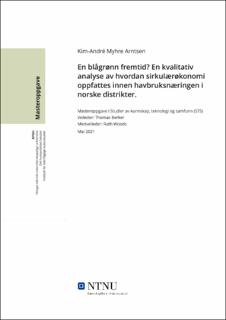| dc.description.abstract | Oppgaven er en kvalitativ undersøkelse som studerer sirkulærøkonomi innad i havbruksnæringen og svarer på hvordan sirkulærøkonomi blir oppfattet innen havbruksnæringen i norske distrikter. Oppgaven tar i bruk STS-teoriene translasjon, innramming og modus 2 for å svare på problemstillingen. Oppgaven er basert på fem intervjuer med fem eksperter som har bakgrunn fra lakseoppdrett, innovasjonsselskap, kursing og rådgivning, dyrefôrproduksjon fra fiskeavskjær samt interesseorganisasjon for næringslivet.
Ekspertene gir inntrykk av at små og mellomstore bedrifter i norske distrikter ikke er opptatte av EU når det kommer til EUs handlingsplan for sirkulærøkonomi, men de er veldig opptatte av det som kommuner, fylker og staten har å si. Tidligere forskning viser at fylker og kommuner har adoptert og tilpasset EUs handlingsplan. Dette gjør at de små og mellomstore bedriftene får det jeg kaller for et proxy-forhold til EU via kommunene og fylkene.
Videre viser det seg at havbruksnæringen rammer inn sirkulærøkonomi som en løsning på forventet fremtidig økonomisk usikkerhet. Næringen må være opptatte av hva fremtidige kjøpere er opptatte av og det vil ifølge informantene være miljø, klima og bærekraft. De tre største sirkulære tiltakene som havbruksnæringen har fokus på per i dag er plastresirkulering, videreforedling av fisk samt tørking og bruk av slam. Næringen jobber fortsatt med å finne gode løsninger og bruk av avfallet sitt, men for at de skal komme frem til noe så legger de kunnskap i bunn.
Næringen driver med kunnskapsproduksjon innad i sine egne bedrifter samt i samarbeid med universiteter, bedrifter og andre kunnskapsinstitusjoner. Denne typen kunnskap blir hovedsakelig produsert for å løse spesifikke problemer samt at kunnskapsproduksjonen blir påvirket av eksterne faktorer som økonomi, politikk, kultur, osv. Men næringen deltar også aktivt med kunnskapsformidling og kursing. Bedriftene henter også inn kunnskap ved å ansette nylig utdannede mennesker med høy kompetanse slik at de får nye perspektiver og kunnskap innad i bedriften som kan bidra til å løse de spesifikke problemene. | |
| dc.description.abstract | The thesis is a qualitative analysis of circular economy within the aquaculture industry, that asks how circular economy is perceived within the aquaculture industry in rural areas in Norway. The thesis utilizes STS theories, translation, framing and mode 2. Interviews with five experts with backgrounds in salmon farming, innovation companies, training and consulting, animal feed production from residual biomass (fish heads, fins, bones, scales, etc.) as well as a representative from a business advocacy group provides the empirical data.
The experts give the impression that small and medium-sized enterprises in rural areas are not concerned with EU’s action plan for circular economy, however, they are very concerned with what municipalities, counties and the state have to say. Previous research shows that counties and municipalities have adopted and adapted the EU action plan. This means that the small and medium-sized companies have what I refer to as a proxy relationship with the EU via the municipalities and counties.
Furthermore, the aquaculture industry frames the circular economy as a solution to future economic uncertainty. The industry is actively interested in what future customers are concerned with and according to the informants they are expected to be interested in the environment, climate, and sustainability. The three circular measures that the aquaculture industry is currently focusing on are plastic recycling, further processing of fish scraps as well as the drying and use of sludge. The industry is still working on finding good solutions to the use of their waste, however, in order for them to arrive at potential solutions and use, they need a solid knowledge base.
The industry conducts knowledge production within its own companies as well as in collaboration with universities, business, other knowledge institutions and companies. This type of knowledge is mainly produced to solve specific problems and the knowledge production is influenced by external factors such as economics, politics, and culture. The industry also participates actively with knowledge dissemination and training. Companies also acquire knowledge by hiring newly trained people with a high degree of competence, so that new perspectives and knowledge can be incorporated helping to solve specific problems. | |
